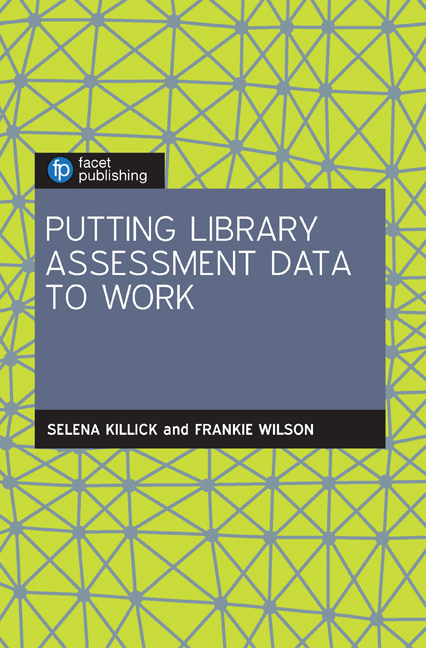Book contents
- Frontmatter
- Dedication
- Contents
- List of figures and tables
- List of case studies
- Authors and contributors
- Acknowledgements
- 1 Introduction to Library Assessment
- 2 Institutional Measures of Student Satisfaction
- 3 Standardised Library Surveys
- 4 In-House Library Surveys
- 5 Library Statistics
- 6 Qualitative Feedback
- 7 Emerging Techniques
- 8 More than Measuring: using Assessment Holistically
- 9 Conclusions
- Index
1 - Introduction to Library Assessment
Published online by Cambridge University Press: 02 October 2019
- Frontmatter
- Dedication
- Contents
- List of figures and tables
- List of case studies
- Authors and contributors
- Acknowledgements
- 1 Introduction to Library Assessment
- 2 Institutional Measures of Student Satisfaction
- 3 Standardised Library Surveys
- 4 In-House Library Surveys
- 5 Library Statistics
- 6 Qualitative Feedback
- 7 Emerging Techniques
- 8 More than Measuring: using Assessment Holistically
- 9 Conclusions
- Index
Summary
The purpose of this book
Many libraries appreciate the need for assessment, to improve customers’ experience, to support advocacy, or both. Librarians reviewing the literature will find no shortage of books to guide them (e.g. Dobbs, 2017; Priestner, 2017; Showers, 2015) and conference papers to inspire them.
The purpose of this book is not to add to the body of knowledge on library assessment, but to address the barriers that most libraries face when considering assessment activities. The central tenet is that there is no need to undertake special data gathering in order to make assessments. Most libraries have huge amounts of data that they have gathered but is sitting on a metaphorical (or in some cases physical) shelf gathering dust, data such as usage statistics, institution-wide survey results, library survey responses and comments books. Using basic skills (all of which can be self-taught from many excellent books within your library and via websites) and a small amount of time, every library can put this data to work to improve customers’ experience.
What is library assessment?
Library assessment is the endeavour of determining and communicating how a library is performing, with the aim of driving improvement. There are three key features of library assessment: focus on stakeholders, the goal of improving services to meet stakeholders’ needs, and communication of the results and outcomes.
Stakeholders are at the heart of library assessment. They are predominantly library users (and non-users), although assessment extends to determining the performance of the library from the point of view of funders and library staff. Consequently many library assessment tools and techniques are geared towards learning about the needs of users (and non-users) and evaluating how well the library supports these needs, in order to improve library facilities, services and resources.
Library assessment is not undertaken for the sake of it, or for merely monitoring purposes (for example recording the number of people visiting the library each month). It is measurement for the purpose of improving the programmes and service. Library assessment involves a continuous improvement cycle grounded in customers’ expectations – data gathering, analysis, interpretation and contextual - isation, determining implications for the library, acting to effect improvement and reporting, and finally evaluating the changes made.
- Type
- Chapter
- Information
- Putting Library Assessment Data to Work , pp. 1 - 12Publisher: FacetPrint publication year: 2019



